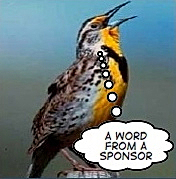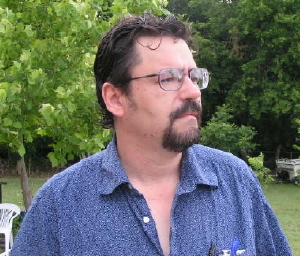* "Oh, Pioneers!"
Regarding the Kansas tornado, George W. Bush said this morning that "[t]here's a certain spirit in the Midwest of our country, a pioneer spirit that still exists. . . ." On the one hand, one must feel sorry for those East-Coast people who never got the "spirit" (paralyzed by some old-world ennui, perhaps) and for those West-Coasters who got all the way to the Pacific Ocean—and to the blunt-dead-end of Manifest Destiny. (Bummer.) On the other hand, the Native American in me feels rather appalled by such an ongoing discourse of imperialism, a celebration of a pioneering spirit that was thoroughly complicitous in land-grabbing and cultural genocide. Indeed, I must confess to being none too proud of the University of Nebraska-Lincoln's relatively recent change to a new slogan: "Pioneering New Frontiers." And so here is my editorial from the Daily Nebraskan (March 2004):
In response to [Professor X]'s critique of those who are unhappy (as I am) with UNL's new tagline invoking "Pioneers," I would first readily acknowledge that the "American" in both "American Indian" and "Native American" is a thoroughly Western linguistic imposition. But the whole issue of naming and identity politics boils down to Audre Lorde's perception that the colonized, in any debate regarding political justice, are stuck with the "Master's tools": i.e., the language (English) of the colonizers—the pioneers.
And of course, "Indian" is a complete misnomer for those peoples on this continent before Columbus's—uh—pioneering voyage. But it was the Euro-American discourse accompanying all subsequent pioneering efforts to the "New World" that interpolated the native as "Indian," and (I would argue) "American Indian" and "Native American"—all linguistically enforced identities that the native has had to adopt by necessity or has been relegated to an ontological void. In sum, following Gerald Vizenor, the "Indian" (and "Native American") was and is the recuperative creation of a Western worldview insecure in its "pioneering" and "progressive" venture of land theft and ethnic cleansing.
Professor [X] wonders, "Should the Sioux change their name ... ?" Well, in line with my main argument—and as a Lakota myself—"Sioux" was never the name of the Lakota, the Dakota, or the Nakota: all three tribes "changed their name" long ago. If the Lakota Standing Bear nearly a hundred years ago employed the term "Sioux," it was as a necessary obeisance to the "Master's tools," the awareness that Anglo society would only recognize him as a person through this god-awful Anishinaabe-French-English appellation. (A viable remedy in "naming," then, might be to refer to each indigenous people by the best English transliteration of their native name [Lakota, Dine, etc.]—and lose all this "Indian" and "Native American" nonsense altogether.)
But as for "PIONEER": yes, one can find completely innocuous denotative definitions thereof, but [X]'s own call for historicism begs one to appeal to the cultural-historical context. Close your eyes, and IMAGINE a "pioneer." I would think most people of the United States, and especially the Great Plains, might well picture a prairie fleet of covered wagons, or Lewis and Clark, or some lone white explorer surveying the plains from the highest butte available. Denotative definitions are fine, but it is the connotation, the undercurrent of ideology, that carries the day.
"Perhaps these insensitive people [others who already protested the slogan] should change their name [emphasis added]," Professor [X] says by way of conclusion. Or perhaps other insensitive people should change their worldview, which continues to see the "unknown"—including the human and natural Other—as eternally fit fodder for conquest.
P.S.: I feel the same way towards recent blithely positive academic conferences concerning "homesteading."

.jpg)


No comments:
Post a Comment